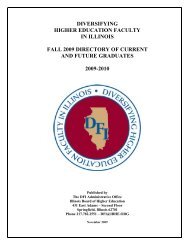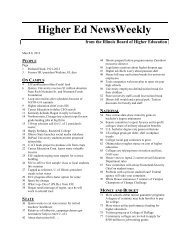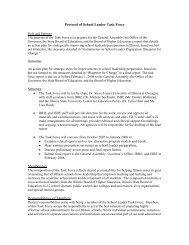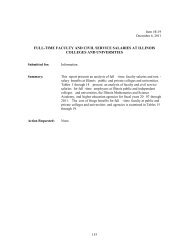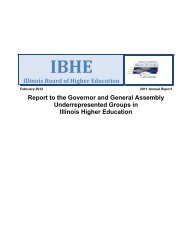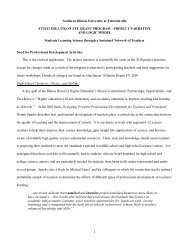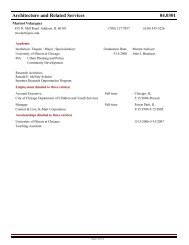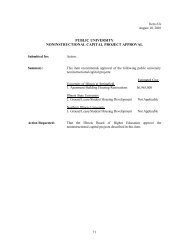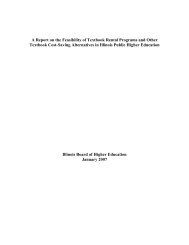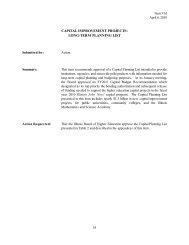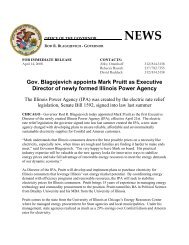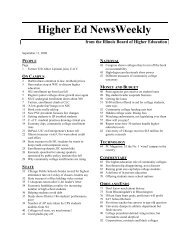Title of Effective Practice: - California Postsecondary Education ...
Title of Effective Practice: - California Postsecondary Education ...
Title of Effective Practice: - California Postsecondary Education ...
You also want an ePaper? Increase the reach of your titles
YUMPU automatically turns print PDFs into web optimized ePapers that Google loves.
Direct Connection to Policy Area 4 <strong>of</strong> The Illinois Commitment<br />
R.E.A.C.H. Summer Bridge Program<br />
William Rainey Harper College<br />
What issue or need is addressed by the effective practice?<br />
The R.E.A.C.H. (Retention Efforts for Academic Completion at Harper) Summer Bridge Program was created<br />
in order to better transition under-prepared (3rd and 4th quartile in their graduating class), first generation<br />
students from high school to college. The desired outcome <strong>of</strong> the Summer Bridge Program is to better provide<br />
under-prepared first generation students with the skill sets needed to succeed in college.<br />
Description <strong>of</strong> the effective practice:<br />
The Center for Multicultural Learning (CML), in collaboration with faculty from the Mathematics and Reading<br />
Departments, launched the R.E.A.C.H. Summer Bridge Program. Thirty-three students gained skills in<br />
mathematics, reading, writing, computer usage, and success strategies: (reasons for pursuing college; time<br />
management; study skills; stress, health, and wellness; learning styles and communicating with faculty;<br />
diversity; career planning; and transfer/educational planning). Students received one-hour credit for Orientation<br />
101 and were enrolled as a cohort in Psychology 106 (Student Skills) or Psychology 107 (Understanding Self) in<br />
fall 2005. Each student met twice during the semester with one <strong>of</strong> the faculty CML counselors to ensure student<br />
progress.<br />
The Summer Bridge Program is a unique way <strong>of</strong> helping at-risk students during the summer before their first<br />
semester. In an intensive, two-week program, students are given resources needed to improve their COMPASS<br />
placement scores and make connections with departments that exist to ensure their academic success. Students<br />
experience high quality education to improve future achievements in the classroom and in their careers as well.<br />
The Summer Bridge Program prepares action-oriented analyses <strong>of</strong> pressing academic concerns facing underprepared<br />
students regarding placement level and achievement in college level coursework. As participants,<br />
students learn <strong>of</strong> the opportunities and services they need to pursue to maintain and/or improve their academic<br />
aptitudes. Students gain critical skills needed for persistent success in college. As a result <strong>of</strong> participating,<br />
students gain necessary skills to smoothly transition into college level coursework.<br />
How does this practice achieve sustainability?<br />
The 2005 Summer Bridge Program was supported by a $28,000 grant from the Harper Foundation. The summer<br />
2006 cohort will be 80 students and the Harper Foundation has provided $33,020. The CML also allocated<br />
$10,000 <strong>of</strong> a HECA (Minority Student Transfer Center) grant to support the students. In FY07, the Harper<br />
Foundation will continue to support the program as Harper begins to institutionalize the cost <strong>of</strong> the program.<br />
What are the results/measurable outcomes?<br />
As a result <strong>of</strong> participation in the Bridge Program: 62% <strong>of</strong> the students increased their reading placement<br />
scores, 68% increased their writing placement scores, and 48% increased their math placement scores.<br />
Participants completed program evaluations indicating that they gained experience in the following areas:<br />
development <strong>of</strong> basic academic reading strategies ( 84%), development <strong>of</strong> basic (writing) composition strategies<br />
(100%), development <strong>of</strong> basic math skills ( 74%), identifying and exploring reasons for being in college ( 87%),<br />
becoming familiar with campus resources (88%), recognizing the value <strong>of</strong> education (91%), having a clearer<br />
sense <strong>of</strong> direction with life/career choices ( 94%), managing time (84%), understanding how to use the Harper<br />
educational system (97%), and developing a sense <strong>of</strong> community and belonging (90%).<br />
Academically: 72% (24) achieved a 2.0 or higher fall cumulative GPA, 100% were retained through fall, 87%<br />
(29) were retained fall to spring, and 62% (18) achieved a 2.0 or higher spring cumulative GPA. A study<br />
conducted by the Office <strong>of</strong> Research indicated participants achieved a significantly higher cumulative GPA than<br />
a comparison group <strong>of</strong> non-participating students.<br />
Contact Information<br />
Name: Laura LaBauve-Maher<br />
Email: llabauve@harpercollege.edu<br />
Phone: (847) 925-6954<br />
122



